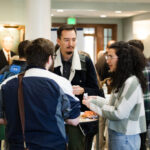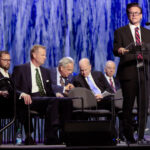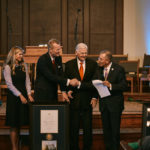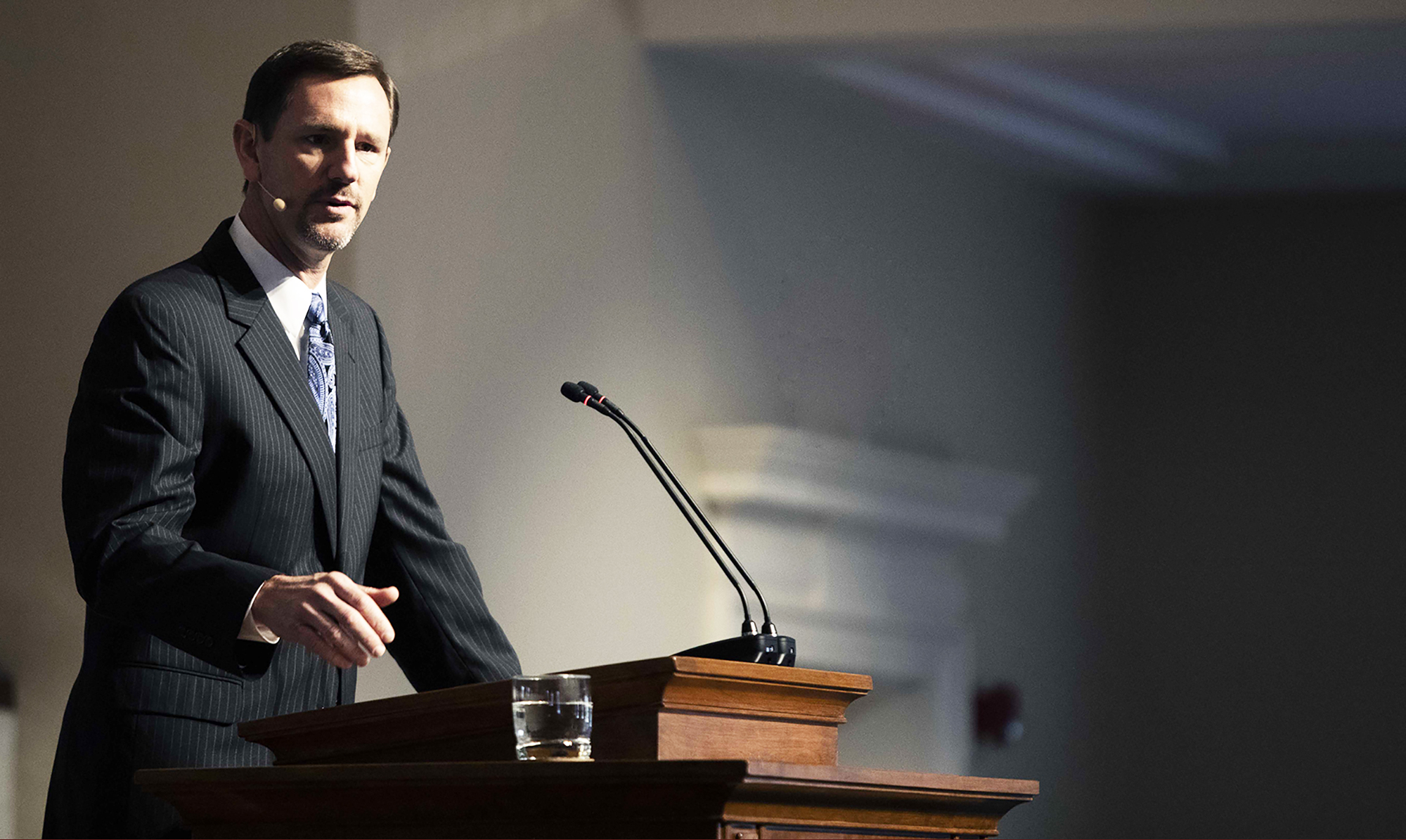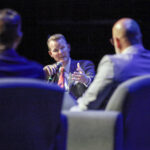
PHOENIX (BP) — Presidents of the Southern Baptist Convention’s six seminaries noted growth in ministry, enrollment and financial support in their reports to messengers June 14 at the SBC annual meeting in Phoenix.
Gateway Seminary celebrates first year in new locations
By Kathie Chute
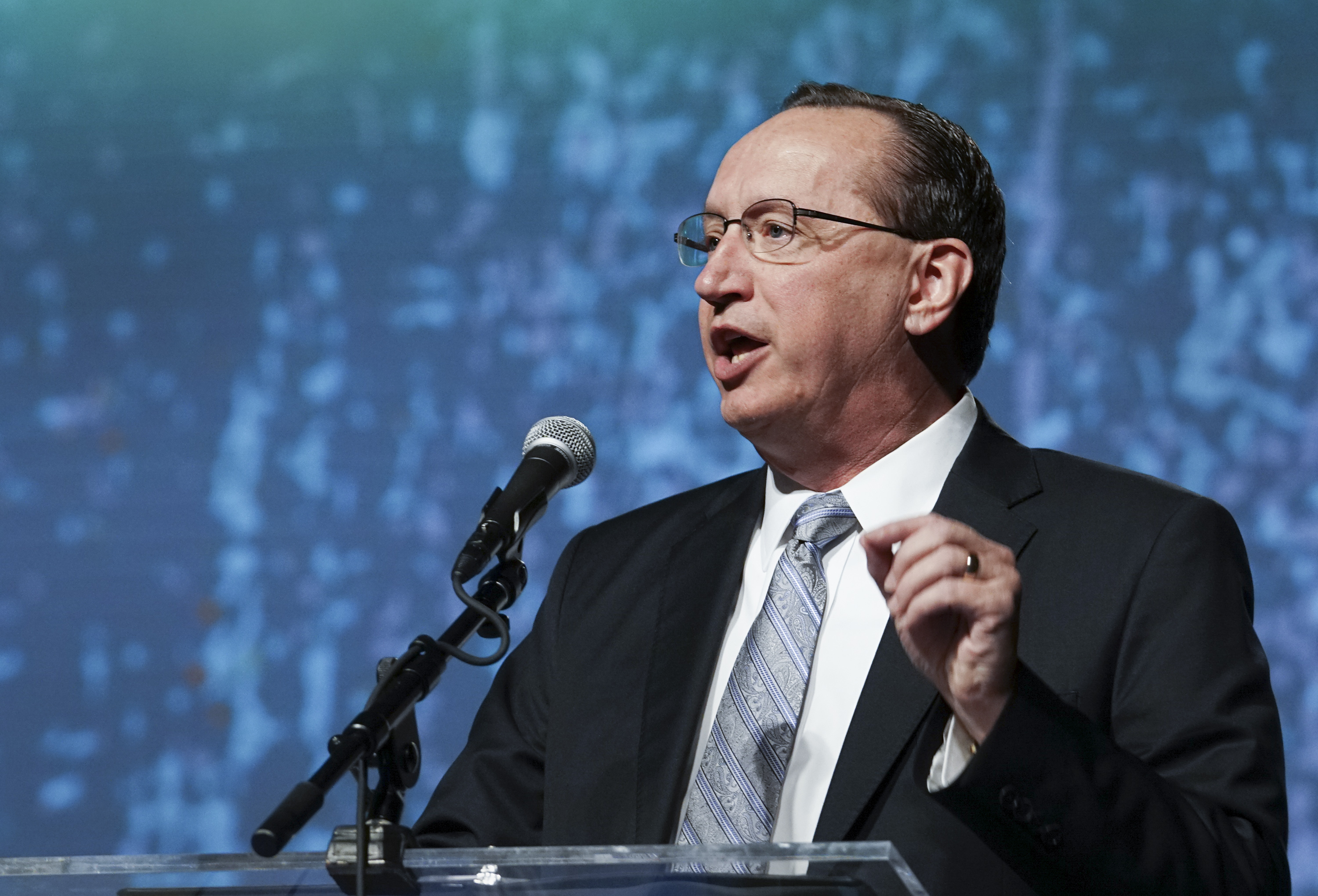 PHOENIX (BP) — Jeff Iorg, president of Gateway Seminary, told messengers of the Southern Baptist Convention that the past year was one of celebration and success with a new name in two new California locations, Ontario and Fremont.
PHOENIX (BP) — Jeff Iorg, president of Gateway Seminary, told messengers of the Southern Baptist Convention that the past year was one of celebration and success with a new name in two new California locations, Ontario and Fremont.
“Built on the legacy of Golden Gate Seminary, we continue to be your seminary in the West delivering theological education and leadership training at our five campuses, including one here in Phoenix,” Iorg said.
In addition to the two new facilities, Gateway launched Gateway Live, a video conferencing system that makes live classroom participation possible from virtually anywhere in the world, and expanded Gateway Online, a delivery system offering multiple degrees in an online format.
“We truly are a global seminary in more ways than ever,” Iorg said.
He announced that a new academic program to train Mandarin-speaking leaders — a Chinese-English bilingual program — will begin this fall and will eventually use all the seminary’s delivery systems to train Mandarin-speaking leaders around the world.
Gateway also has retooled the Contextualized Leadership Development program with a simplified curriculum and a new name, Advance.
“This program continues to be a vital entry-level program for students with limited English language skills as well as a key source for training bivocational ministry leaders across the West,” Iorg said. “We are grateful to announce we have received nearly $2 million in special gifts this year to support our work and launch these new initiatives.”
Iorg said the biggest celebration was the number of new students who enrolled at Gateway.
“We pushed hard for students to graduate so they would not have to relocate when the seminary moved,” he said. “Now that we are fully operational in our new locations, we are seeing large numbers of new students enroll, including an all-time record of new applicants approved for this coming fall. We are rebuilding our student body and expect it to grow to its former strength and beyond in the next few years.”
Iorg said that the seminary also experienced sadness in the death of President Emeritus William O. Crews, who died in February after a brief illness.
As Iorg was sorting through Crews’ presidential papers, he came across a letter from Harold Graves, former Golden Gate president. It explained the presence of a small plaque over the door of a classroom at the former campus in Mill Valley, Calif., that read “William Conover Chapel.” No one knew Conover or how the room had received its name.
The letter from Graves explained that the seminary had had difficult months following the 1950 decision of the SBC to accept it as an institution to be owned and operated by the convention. The summer before the SBC would assume control on Jan. 1, 1951, it was apparent they must act sooner if the school was to survive. The seminary’s chairman of the board wrote the SBC Executive Committee and asked for a special allocation of $50,000 to allow classes to open for the fall semester.
“Almost simultaneously with this exchange of letters, the Executive Committee received a letter from an attorney concerning the settlement of an estate,” said Iorg, reading from the letter. “[In 1932] a Mr. William Conover had died, leaving his estate in trust for his children and grandchildren. They were to be paid income until their deaths, and then the residue was to be given to a Southern Baptist seminary.
“The heirs had all died, leaving $51,839.81 in the estate. After due consideration, the Executive Committee sent a check to Golden Gate Seminary for $53,000.”
Iorg noted that Graves had concluded the letter with the exclamation “God works in mysterious ways, His wonders to perform.”
“William Conover died in 1932, Golden Gate was founded in 1944 and was adopted by the SBC in 1950. Now, 85 years after Mr. Conover’s death and 65 years after his gift saved our school, Gateway Seminary stands strong as a Southern Baptist sentinel in the West for the Gospel of Jesus Christ.”
Iorg expressed thanks to the Executive Committee in the 100th anniversary of its work for their support of the seminary.
“Thank you for your skilled leadership today and the history of your work in our school. The Executive Committee saved our school in the 1950s and you continue to sustain us in our work today.”
He also thanked Southern Baptists for their support.
“Thank you, Southern Baptists, for standing with us. Thank you for supporting us through the Cooperative Program, for sending us students and for praying for us. We are proud to be a seminary of the Southern Baptist Convention.”
**********
Allen reports MBTS ‘sweet season of growth, health & vitality’
By T. Patrick Hudson
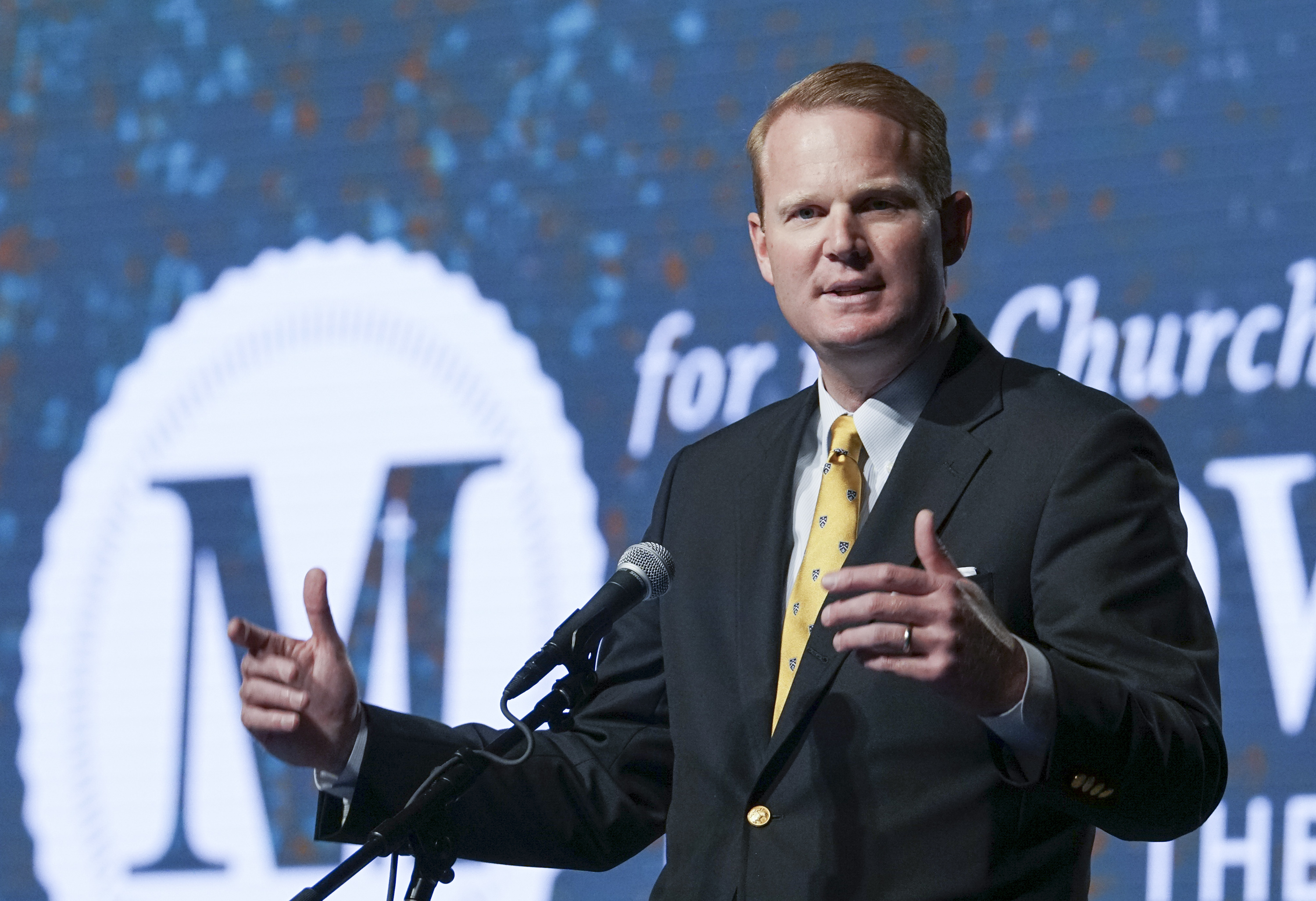 PHOENIX (BP) — Midwestern Baptist Theological Seminary President Jason Allen’s report to the messengers at the 2017 Southern Baptist Convention annual meeting reflected on God’s goodness to the institution over his now nearly five-year tenure in Kansas City.
PHOENIX (BP) — Midwestern Baptist Theological Seminary President Jason Allen’s report to the messengers at the 2017 Southern Baptist Convention annual meeting reflected on God’s goodness to the institution over his now nearly five-year tenure in Kansas City.
“Southern Baptists have six institutions, and each have proven themselves to be perennially strong, healthy and more than worthy of the support of Southern Baptists,” Allen said. “Yet, in Kansas City, God has been good to bless us with an especially sweet season of growth, health and vitality.”
Midwestern’s enrollment stood at 1,200 students approximately five years ago, he noted; now, the seminary is about to surpass the 3,000 mark.
Allen noted a key reason for the marked increase: “I believe it goes back to three words: For the Church.
“Our vision is clear … we are committed to serving Southern Baptist churches…. This is not part of our mission; it is our mission. This is a testimony not to human agency, but of God’s work. It is also Southern Baptists who are sending us their students.”
Not only is the quantity of students remarkable, Allen said, but the quality of students coming to Kansas City is impressive as well. Students are arriving on campus with a drive and motivation to serve the local church — both locally and internationally, he said, noting that it bodes well for the future.
Allen also reported that God has blessed the seminary through financial support, with nearly $20 million in gifts and pledges having been given over the past four years, which is more than all the support raised from 1957 until 2012 combined.
Updating the messengers, Allen said that construction is underway toward a 40,000-square-foot student center that will include a gymnasium, cafeteria, bookstore, café, seminar space and workout facilities. The planned completion date is June 1, 2018, and thanks to the generosity of the Mathena family of Oklahoma City and many others, the construction will be accomplished with no long-term debt.
Allen further noted the seminary’s strong financial position is paying dividends for incoming and existing students, “The financial strength that God has blessed us with through generous contributions and enrollment growth, we are especially using to keep tuition low so that those who come to study at Midwestern Seminary can graduate unencumbered by debt.
“They can also graduate as quickly as possible … so they can deploy for local church service. Affordability is, indeed, a spiritual issue. Thank you, Southern Baptists, for enabling us to make theological education so very affordable.”
Concluding his report, Allen spoke of two new initiatives taking place at Midwestern Seminary, and praised one existing program.
Allen explained the Timothy Track M.Div., which pairs incoming M.Div. students with Kansas City-area churches in internships. The program provides these students with personal, hands-on mentorship opportunities with Southern Baptist pastors and also enables them to exercise their spiritual gifts while in seminary. Allen added that those participating in the program can earn a 50-percent scholarship.
Allen also noted The Residency Ph.D. track, which is especially geared for those who sense a calling into Christian theological higher education. This track, for those who study in residence, will offer special classes and mentorship opportunities with faculty and guest lecturers, so they can obtain the best preparation possible to serve in Christian seminaries and colleges and prepare the next generation of pastors and ministry leaders.
Lastly, Allen praised the seminary’s Fusion program, which partners with the IMB in training incoming college freshmen for service in the mission field. Personally witnessing these students’ gospel efforts in difficult Middle Eastern locations, Allen noted, “This is the very best of what Southern Baptists, your seminaries and Midwestern Seminary are all about. To be ‘For the church’ is to be ‘for the nations.'”
**********
Kelley: NOBTS centennial to focus on Gospel & missions
By Marilyn Stewart
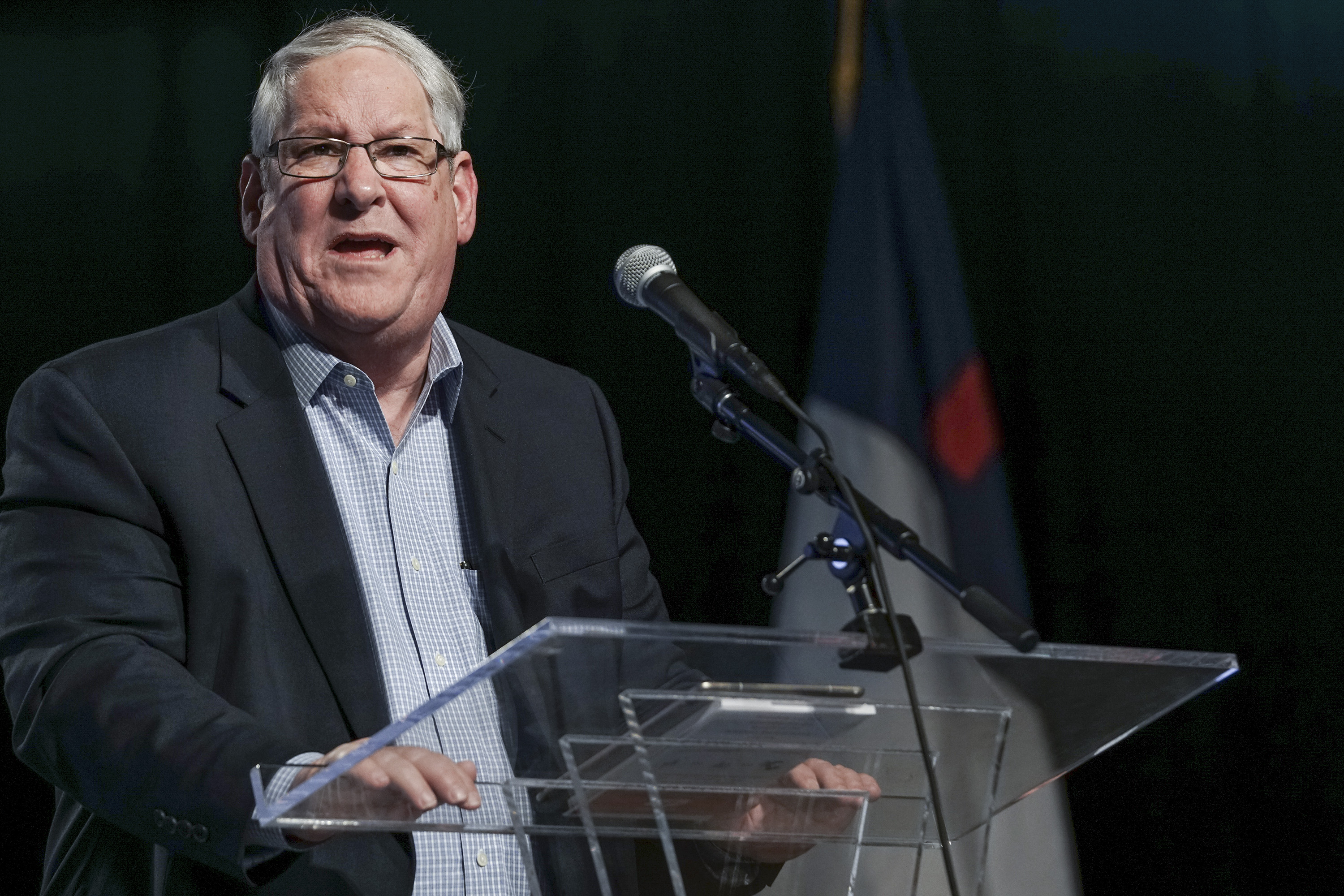 PHOENIX (BP) — New Orleans Baptist Theological Seminary President Chuck Kelley greeted convention delegates with a good news/bad news scenario in his seminary presentation June 14.
PHOENIX (BP) — New Orleans Baptist Theological Seminary President Chuck Kelley greeted convention delegates with a good news/bad news scenario in his seminary presentation June 14.
“Are you ready for some good news?” Kelley asked. “Today, we are 100 years old at NOBTS.”
Centennial events launch Oct. 3 with special activities and emphases on campus and at extension centers continuing throughout the year.
But the NOBTS 100th birthday celebration must not be like any other celebration, Kelley said, “because of the present state of the Southern Baptist Convention.”
Kelley referenced findings by the NOBTS Leavell Center for Church Growth and Evangelism on the continued decline in baptisms in Southern Baptist churches. Presenting a chart of the findings to messengers, Kelley called the statistics “stunning.”
Kelley said church plants are “absolutely essential” but the drop in baptisms demands Southern Baptists’ attention, with the NOBTS centennial being no exception.
“We need to celebrate in a way that will strengthen our seminary and our churches,” Kelley said, issuing a challenge to the convention to join with the NOBTS family in a centennial initiative goal of 100,000 Gospel conversations and 100 mission efforts.
The call for action is in keeping with the charge given the seminary at its founding, Kelley said.
Kelley recounted the seminary’s history that began with a resolution at the 1845 convention in Augusta, Ga., calling on the Board of Domestic Missions, now the North American Mission Board, “to direct its effective attention to aid the present effort, to establish the Baptist cause in the city of New Orleans.”
Established by vote of the convention in 1917, NOBTS was directed to have as its “primary purpose the object of missionary propaganda,” Kelley recounted.
Through the NOBTS Caskey Center for Church Excellence, student scholarship recipients share the Gospel weekly, Kelley noted. In the three years since its founding, the Caskey Center has reported 17,973 Gospel conversations, with 6,987 asking for a response and 1,766 coming to faith in Christ.
Kelley echoed an observation made by NOBTS Caskey Center director Mark Tolbert that believers “drift” away from evangelism and that Gospel conversations must be intentional.
To remedy the drift from evangelism, Kelley suggested a “Monday morning prayer” asking God for the opportunity to share the Gospel during the week and courage to ask for a response. A special app for reporting Gospel conversations and mission efforts is available at www.caskeycenter.com.
Along with centennial events, a $50 million capital initiative is underway to help fund scholarships for students, strengthen endowments and provide needed campus renovations, Kelley said.
Continuing through Oct. 2, 2018, the centennial celebration will center around three focal points: celebrating the past, embracing the present and casting a vision for the future. Details are available at www.nobts.edu/100.
In a heartfelt aside, Kelley recounted a “stain” on NOBTS’ history in which the seminary established a separate school to train African American students early in the 20th century. Today, that “dynamic has changed,” Kelley reported as steps toward a better relationship have been laid. Kelley pleaded with messengers to stand united against racism at every front.
Kelley concluded with, “May God use the occasion of our 100th anniversary to prepare NOBTS for the future and to prepare the SBC for a mighty movement of God.”
***********
Akin celebrates Great Commission efforts at Southeastern
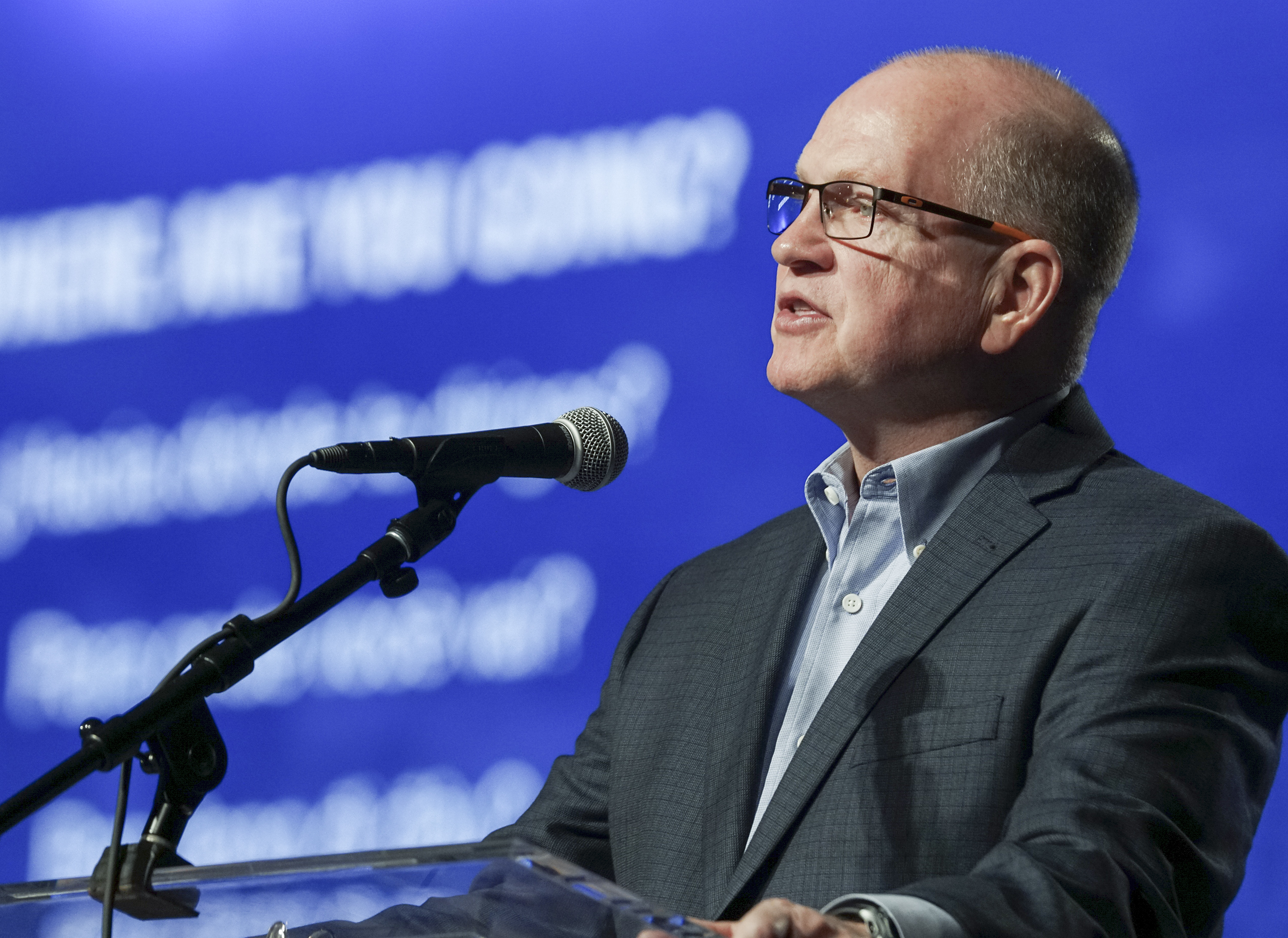 PHOENIX (BP) — Danny Akin, president of Southeastern Baptist Theological Seminary, began his presentation to the Southern Baptist Convention quoting 18th-century missionary Henry Martyn who said, “The spirit of Christ is the spirit of missions. The nearer we get to Him, the more intensely missionary we become.”
PHOENIX (BP) — Danny Akin, president of Southeastern Baptist Theological Seminary, began his presentation to the Southern Baptist Convention quoting 18th-century missionary Henry Martyn who said, “The spirit of Christ is the spirit of missions. The nearer we get to Him, the more intensely missionary we become.”
Akin highlighted the Great Commission as the heartbeat of Southeastern throughout his June 14 report as he spoke of numerous initiatives that the seminary has begun throughout the world.
“We are to serve the churches of the SBC by training and equipping disciple-makers who will make disciples among the nations here in America and around the world,” Akin said.
Southeastern is making disciples through its Global Theological Initiatives, he said, by providing theological training on five continents throughout the world. These efforts to provide seminary training include the Persian Leadership Program, Hispanic Leadership Development Initiative, starting a new Vietnamese Baptist seminary and providing strategic theological training in Sub-Saharan East Africa.
Another way Southeastern is making disciples within the state of North Carolina is through its North Carolina Field Minister Program, which seeks to disciple long-term prisoners through theological education through The College at Southeastern. Akin noted that this will be provided in Fall 2017 in partnership with the North Carolina Department of Public Safety and Joe Gibbs as well as Game Plan for Life.
Chuck Lawless’ new role as vice president of spiritual formation was described as an effort by Southeastern to more effectively emphasize the spiritual formation and prayer of its students.
“We’re known as a Great Commission seminary but we also want to be known as a praying seminary as well,” Akin said.
Southeastern’s Kingdom Diversity Initiative, which was launched this year, has helped the seminary expand its minority enrollment, moving from 8.3 percent in 2011 to 18.1 percent in 2017, an 18 percent gain.
In relation to the vote on amendment 10 to oppose the alt-right movement, which messengers passed overwhelmingly Wednesday afternoon, Akin said emphatically of Southeastern, “We will be there and we will vote.”
Akin noted some of Southeastern’s key academic programs, including expository preaching on the bachelor’s, master’s and doctoral levels as well as a master’s degree in Christian marital and family counseling and a Ph.D. in biblical counseling.
Akin concluded by thanking the messengers for their support of Southeastern.
“We could not do what we do without the love and support of Southern Baptists,” he said.
**********
Mohler: Southern prepares leaders for secularized culture
By Aaron Cline Hanbury
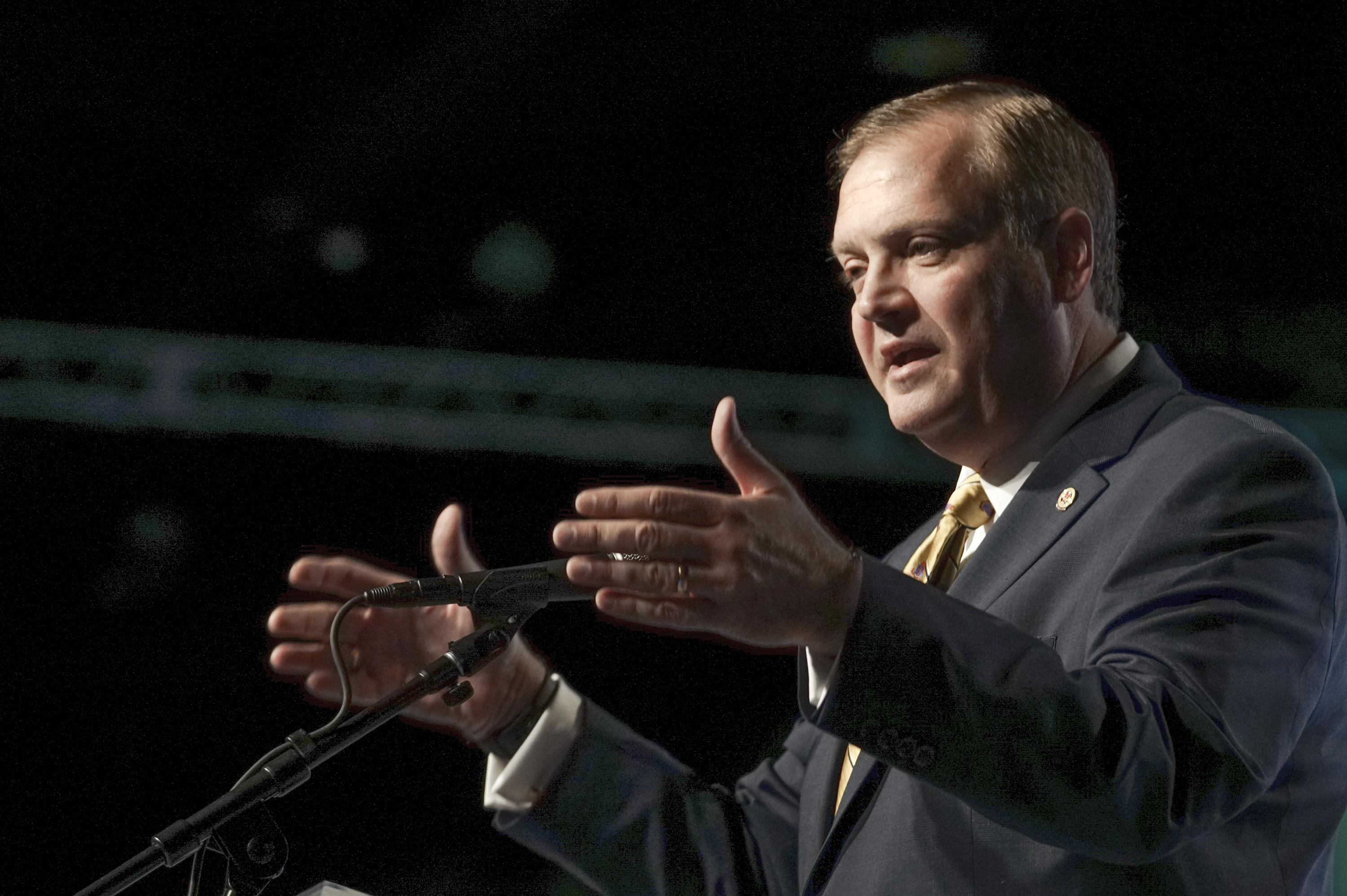 PHOENIX (BP) — The urgency and complexity of missions in the 21st century propels the work of Southern Baptist Theological Seminary, R. Albert Mohler Jr. said during his June 14 report to the messengers of the Southern Baptist Convention.
PHOENIX (BP) — The urgency and complexity of missions in the 21st century propels the work of Southern Baptist Theological Seminary, R. Albert Mohler Jr. said during his June 14 report to the messengers of the Southern Baptist Convention.
Mohler, the seminary’s president, opened his remarks pointing to the fourth chapter of Book of Acts, where the apostles Peter and John face the Sanhedrin. The two, despite threats from the religious leaders, declare they “cannot but speak of what [they] have seen and heard,” referring to the life and work of Jesus Christ.
Mohler then asked, “What does it take to produce that kind of conviction?”
“We recognize we are in a very different age than Southern Baptists knew in the second half of the 20th century,” Mohler said. “We are now facing the headwinds of an increasingly secularized culture.”
This urgency, Mohler said, is a constant, which faced Peter and John as well as contemporary believers. But that doesn’t mean it looks the same today as when Southern Seminary began training pastors in 1845.
“We are sending out pastors and missionaries and evangelists into a world where a recent [Barna Group] study categorized American cities — metropolitan area by metropolitan area — in terms of the ‘churched,’ ‘the unchurched,’ ‘the dechurched’ and ‘the post-Christian,'” Mohler said. “That’s not a world that was envisionable in 1845; it’s not a world Southern Baptists would have recognized in 1965; it’s not a world most of us thought we’d see even in the year 2000….
“We recognize that we used to come together to talk mostly about the mission field ‘out there’ — and now we’re dealing with the mission field right here.”
Mohler pointed specifically to two actions Southern Seminary takes to prepare students to meet this shifting global context: the seminary’s Bevin Center for Missions Mobilization and the Jenkins Center for the Christian Understanding of Islam. He noted, too, that currently a team of Southern students and faculty members are in North Africa ministering to missionaries who work predominantly with Muslims.
Mohler also reported to messengers that Southern Seminary now trains 5,500 students on campus and online, including 2,000 men in the master of divinity degree program studying to be pastors and hundreds of students scattered around the world.
“What Southern Baptists dreamed of doing in 1845 has been far exceeded by what the Lord has allowed Southern Baptists in this generation to do.”
**********
Southwestern highlights global theological education
By Alex Sibley
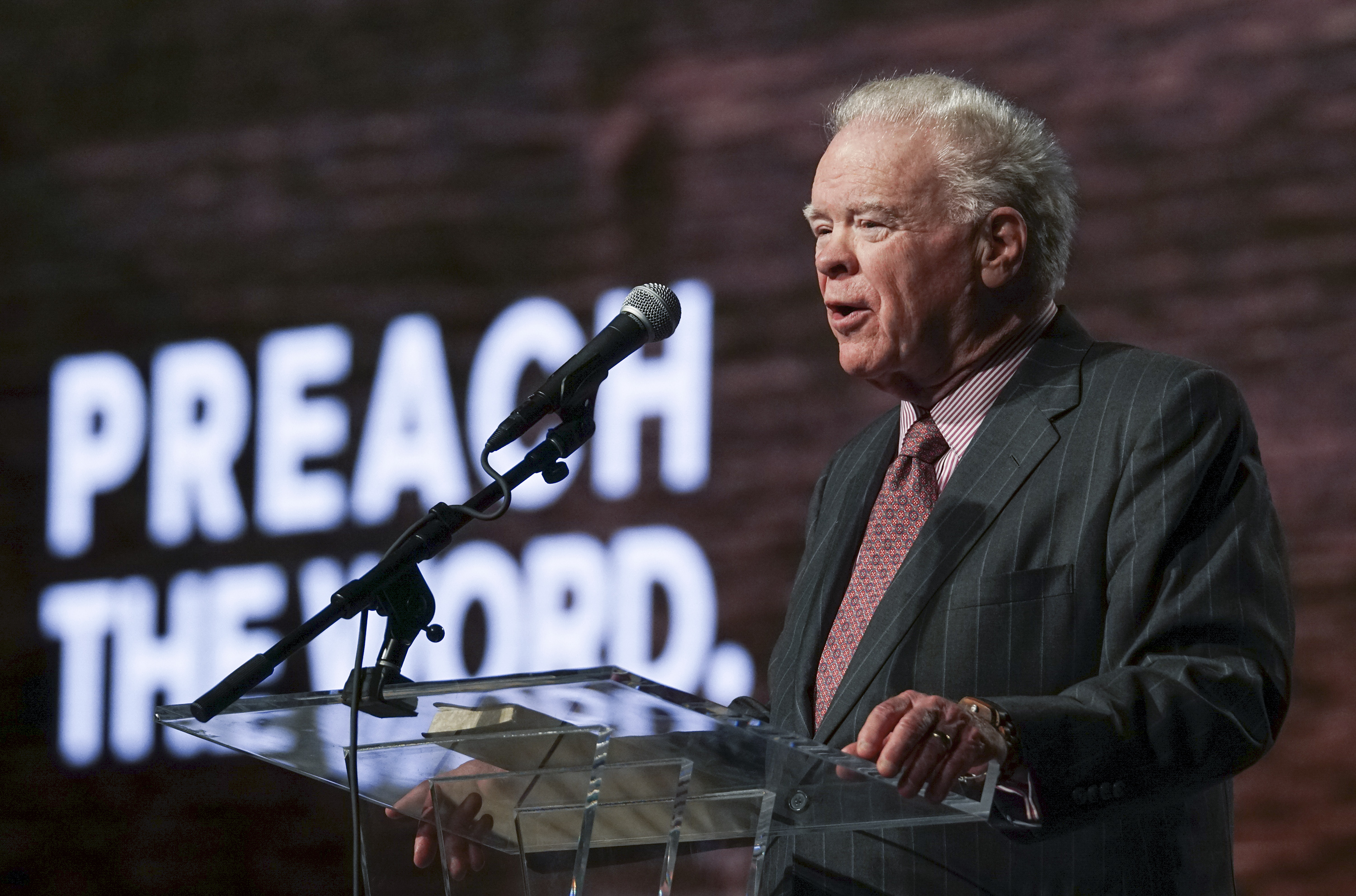 PHOENIX (BP) — Southwestern Baptist Theological Seminary President Paige Patterson updated convention attendees on the ongoing work of the Patterson Center for Global Theological Innovation (GTI).
PHOENIX (BP) — Southwestern Baptist Theological Seminary President Paige Patterson updated convention attendees on the ongoing work of the Patterson Center for Global Theological Innovation (GTI).
Patterson showed a video highlighting the recent graduation of 11 Ecuadorian pastors and church leaders from Southwestern’s Maestría de Estudios Teológicos (MET) program.
The graduation was the result of a three-way partnership between GTI, PESCA Baptist Theological Seminary in central Ecuador and Tabernacle Baptist Church of Ennis, Texas.
The partnership began in 2015 and saw 11 students from across the country enroll in Southwestern’s online MET program with the purpose of eventually becoming PESCA seminary’s faculty. Tabernacle was then recruited as a “Champion Church” to support the students and the seminary with prayer and financial aid. Now, just two years later, all 11 students have completed their master’s degrees and will now train future ministers to further God’s Kingdom in Ecuador.
Patterson said things like this are happening in 146 locations around the globe through GTI.
“There has never been a time when Southern Baptists, through their seminary education, have circled the globe like we have now,” Patterson said. “Thank God for what you have done to make that possible in a thousand different ways.”
Patterson also highlighted Southwestern’s archaeology program. “Biblical archaeology was on the verge of just dying out,” he said of the diminishing role of archaeology in seminaries in years past. “By the grace of God, we have seen that revived today, and we [Southwestern] have archaeological digs going on in five different countries now.”
Patterson specifically cited the discovery of an ancient city in Kazakhstan along with its adjacent graveyard, where tombstones were found bearing crosses. As stated in the report from Southwestern’s Tandy Institute for Archaeology last fall, this is the first archaeological evidence for a Christian community in the borders of the Republic of Kazakhstan.
“This discovery supports the understanding of ancient Kazakhstan as a multicultural center between the East and West, with Muslims, Buddhists and Christians living among the local herdsmen and nomadic tribes,” the report stated.
Patterson ended his report by inviting messengers to attend the SBC’s annual meeting in Dallas, “that little bedroom community next to the thriving metropolis of Fort Worth, Texas,” in 2018. The Dead Sea Scrolls exhibit, the newly unveiled lane of Southern Baptist martyrs and Lottie Moon’s actual house from P’ingtu, China will make the Southwestern campus a worthy place to visit next year, Patterson said.
Moon’s house will be located in Mathena Hall, the new home of the Roy Fish School of Evangelism and Missions and Scarborough College at Southwestern.

